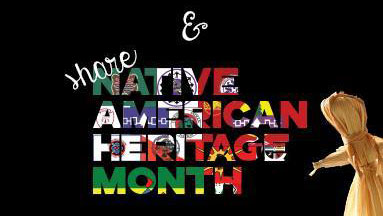The true history of Native Americans is often clouded by American history lessons that teach students to memorize: “In 1492, Columbus sailed the ocean blue,” and discovered the land that is now America. This is integrated into school curriculums from early on and does not teach the story in its entirety.
RahK Lash, assistant director for multicultural affairs, explained the importance of learning about Native American culture.
“So many of us don’t get this in K-12. We get the ‘Columbus sailed across the sea in 1492, sat down and had a beautiful dinner, and everything was fine,’” Lash said. “We don’t talk about the massacre or what Thanksgiving really was.”
According to the official website for Native American Heritage Month, November was first established as Native American Heritage Month in 1990 by former President George H.W. Bush as an effort to recognize the numerous contributions made by the “first Americans.”
Ithaca College Natives, a student organization dedicated to promoting traditional native cultural values and history, is currently inactive due to a lack of student involvement. Junior Victor Lopez-Carmen is the only remaining member of the organization. He said the organization has struggled attracting new members since he first joined during his freshman year. According to the Office of Institutional Research, 0.1 percent of full-time students in Fall 2015 identified as American Indian or Alaska Native. This equates to a total of six students out of the 6,769 students currently enrolled.
“There are not enough native or indigenous people on campus to run the organization. It’s hard to find people who identify as Native American,” Lopez-Carmen said. “We were always struggling to retain members.”
Lash said this occurrence is typical among student organizations.
“What tends to happen with student organizations is that they have their seasons,” Lash said. “So a lot of student organizations, across the board, will have heavy membership and then a few years later it’ll kind of die out a little bit and then a few years later the interest will be back.”
IC Natives is open to students of all ethnic backgrounds, not just those who identify as Native American. Lopez-Carmen said having these types of organizations on campus is crucial in creating a community for people from similar cultures.
“I come from a very strong, tight-knit community on a reservation,” he said. “I really do appreciate being part of a community because I know it’s very important in many aspects: mental, physical, emotional and spiritual.”
In previous years, IC Natives has been in charge of organizing Native American Heritage Month activities on campus. However, due to the current inactivity of the organization, a committee of students and faculty has been formed to take over. Lash, who is a member on the committee, said in planning the events he looked at previous years and spoke with many students and faculty members who were very involved with indigenous groups on campus and in the community. In addition, the committee visited the “First Peoples’ Festival,” a festival celebrating Native American heritage, on Oct. 3 on The Commons. The festival included indigenous performers, food and craft vendors, and interactive workshops.
Through these events being held on campus, Lash said he hopes to create educational learning opportunities and a chance to increase cultural competence among faculty, staff and students.
“By coming to these events, we may not specifically be talking about the exact history, but it’s an inside perspective and an opportunity for you to challenge your awareness,” Lash said.
As Native American Heritage Month continues, Lopez-Carmen explained the importance of preserving the Native American culture.
“There are so many things in our culture that are good for everyone,” he said. “As people reject indigenous culture, it seems like so many things suffer, especially with the environment.”














